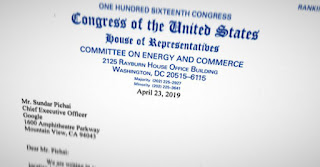U.S
Congress has sent an open letter to Google CEO Sundar Pichai asking for more information about its Sensorvault database that’s reportedly being used by law enforcement agencies to solve crime cases.
Last week, we reported a story based upon NY Times findings that revealed how using a "geofence" warrant, authorities obtain location history of all devices from Google's Sensorvault database that pass through a crime scene over a certain time period.
For those unaware, Google maintains Sensorvault database over nearly the past decade which contains precise location information from hundreds of millions of smartphones around the world and shares it with authorities to help in criminal cases.
However, Google does not share identifiable information on all devices after receiving a warrant. Instead, authorities have to first narrow down their list of suspects using the location history data, only after which Google shares further information about a few selected users (suspects or witnesses).
Now top U.S. lawmakers from the U.S. House Energy and Commerce Committee on Tuesday wrote an open letter to Google raising concerns about the database and seeks a briefing on how it is used and shared by the company.
"The potential ramifications for consumer privacy are far-reaching and concerning. We would like to know the purposes for which Google maintains the Sensorvault database and the extent to which Google shares precise location information from this database with third parties," the letter reads.
The letter contains 10 detailed questions, mentioned in-brief as below that the company has been asked to answer by May 7, 2019:
What information Google stores in the Sensorvault database, why and how does Google use it?
Which affiliate and subsidiaries of Alphabet company have access to this database?
Does Google maintain any other database on users’ location information, and if yes, how it is different from Sensorvault?
Who within Google can access the Sensorvault database and what are their job roles?
What are the sources from which Google collects information contained in Sensorvault database?
Can users opt-in or opt-out to allow or prevent Google from collecting information stored in the Sensorvault database?
What's Google's retention policy with respect to the information the company collects on its customers?
Does Google share, sell or disclose customers location information with any third-party other than law enforcement?
Besides this, the members of Congress—including Committee Chairman Frank Pallone, a Democrat from New Jersey, and ranking Republican Greg Walden—have also requested Sundar Pichai to issue a briefing on these topics by May 10.

Comments
Post a Comment